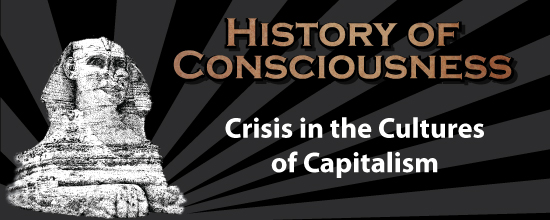Announcing a New Vision for History of Consciousness
The History of Consciousness department at UCSC announces a new vision for its graduate program involving the creation of projects (called concentrations) as part of a two-year admissions cycle. The first of these, beginning with this fall’s (2012) admissions, is "Crisis in the Cultures of Capitalism." Students interested in applying under this rubric should so indicate.
(The department will continue to admit outstanding students regardless of whether they are part of the project, and students may change the foci of their study as their intellectual interests develop. Students already enrolled in other UCSC departments and all students in History of Consciousness are eligible to take the graduate courses offered under the project rubric; they may also, if they choose, receive a Designated Emphasis in History of Consciousness.)
This consortium approach to curricula and graduate admissions with a distinctive intellectual ethos seeks to foster the problem-driven research vital to new forms of knowledge and intelligibility, and to meet the challenges of imagining new modes of scholarship for the arts, social sciences and humanities today. We seek to shape a future in which the intellectual ambition vital to research and teaching in the humanities is attuned to the value of interdisciplinary study. Outstanding expertise in creating the conditions for that engagement and forging creative research communities of graduate students have been key strengths and goals of the History of Consciousness Department; the project approach to graduate education formalizes that goal through an expanded inclusion of faculty and students from other UCSC departments engaged as a consortium in related endeavors. Each project invites the participation of faculty from other departments. Affiliated, associated and other faculty at UCSC are invited to teach and mentor graduate students and to develop year-to-year symposia and curricula. Faculty are also encouraged to propose and develop future projects. The History of Consciousness department thus hopes to function as a catalyst for developing new and highly visible forms of collaborative graduate education at UCSC. Participants in the consortium have the opportunity to create a research culture that is at once responsive and responsible, socially engaged and socially challenging, anchored by their individual involvement with graduate students.
Little more than twenty years after the end of the Cold War, worldwide economic disorder is raising questions about the future of capitalism. The perceived failure of governments to respond effectively to worsening economic conditions has triggered widespread protests, and politics and popular culture have both adopted a decidedly apocalyptic tone. It is thus a moment that compels rigorous and inventive approaches to analysis and interpretation of these problems.
In response, The History of Consciousness Department proposes “Crisis in the Cultures of Capitalism,” a two-year, interdisciplinary program of courses, colloquia and study groups. “Crisis in the Cultures of Capitalism” seeks to provide a forum for the consideration of the economic, political and cultural dimensions of this global crisis. The objectives are: 1) to promote graduate student scholarship, and 2) to encourage faculty collaboration and intellectual community within this emerging area of critical inquiry. What forces lie behind the rise and crisis of financialization? Why and how did levels of debt and inequality rise? How does the current crisis compare to crises of the past, and what might it indicate about the future? What new social movements and cultural identities arise in response to this crisis? What political and cultural possibilities are opened up in different regions of the world? These and many other questions will be addressed in the seminars, talks and publications that emerge from this project over the coming years.

